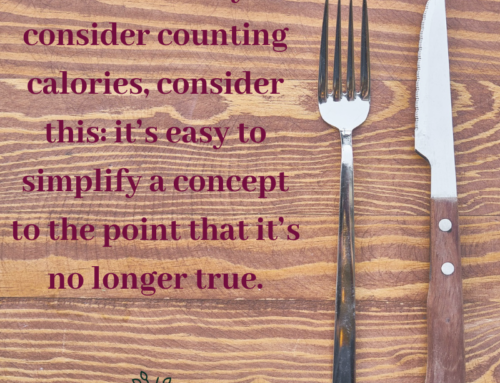Dieting and counting calories can be a precursor for eating disorders. The National Eating Disorders Association reports that 35% of “normal dieters” progress into pathological dieting and 20-25% of dieters develop an eating disorder. And since counting calories is a primary focus of many diets, I want to encourage you to stop counting calories. Counting calories is not vital to maintaining a healthy weight. It’s not sustainable for most individuals and doesn’t often address the actual behaviors that contribute to unhealthy outcomes.
Often the more you count calories the less in-tune you are with your hunger and fullness satiety cues. And the less likely you are to eat the foods you enjoy. Food becomes a number. And if you go over that number, you think it’s a bad day. And when you go under that number, well, you might think it’s a good day but feel unsatisfied.
Most people blame a lack of willpower for not being able to stick to the number that is assigned to them when counting calories. In reality, it has nothing to do with willpower. And is more likely attributed to the fact that your body is hungry and the number isn’t right for your body.
I’m not using the phrase “lose weight” because I think it’s more important to focus on other outcomes. I think long-term happiness with your body stems from making small behavior changes instead of focusing on a specific number on the scale.
Here are 5 ways to manage your weight without counting calories.
Identify the food choices that are influencing your weight.
Rather than focusing directly on the calories, take some time to think about your food choices. Do you tend to save your calories for dinner? Do you tend to skip breakfast? Do you avoid vegetables? Do you drink a lot of calories (soda, juice, alcohol)?
There are certain food choices that will have a bigger impact on your weight. Once you have identified a behavior that you feel is influencing your weight in a way you don’t like, create a goal to address this behavior. Start with one goal and one behavior change.
Sit down to eat your meals.
A research study found that families who ate dinner together as a family at the table tended to have lower BMI than individuals who ate with the television on. Eating and talking together makes meal times enjoyable and the lack of distraction from the television helps you focus on food.
Simplify meals.
Most people have one meal that is specifically hard to prepare for. Which likely leads to a skipped meal or eating less nutritious foods. For some, breakfast is nearly impossible due to getting everyone out the door on time. While for others eating lunch can be a challenge due to busy work schedules. And then for many of us getting dinner on the table before everyone feels too hungry can feel like the biggest accomplishment of the day. Whichever meal it is for you, simplify it. This could mean making a big batch of something and being able to grab it throughout the week. It could mean making overnight oats. Or could mean making bigger dinner portions so there’s leftovers for lunch.
Downsize plates and bowls.
One review of several studies found buffet locations that used large plates served 52% more and individuals at these locations ate 45% more than when they ate at locations with smaller plates. Another study found that children served themselves more food when using larger plates and bowls.
Adjusting plates and bowl size is an external control for food. I think external controls can be helpful but should not become dictators of our behaviors. Use plate size to be more mindful of how much food is going onto your plate. But then still be mindful of your hunger and fullness cues.
Move your body.
Exercise, regardless of weight loss, provides numerous health benefits, and I always encourage clients to find a type of movement that feels good to them. Over the past few years, there has been several articles promoting the fact that exercise alone is not an effective technique for losing weight. And I agree as there are several factors that go into losing weight. It’s not always as easy as calories in vs calories out. But I say let’s also make one thing clear: No matter how physical activity impacts your waistline, it does your body and mind good. It’s also helpful to pay attention to how much non-exercise related activity you are engaging in. Like household chores, daily movement, taking the stairs, walking the dog, etc. All of this movement adds up.
Bottom Line
Finding that sweet spot of how much exercise to engage in, how much food you need, and managing your weight can take some practice. It takes time to listen to your body and to adjust how you think about food and exercise. The more mindful you become about your body and your food, the easier it will be to feel comfortable with your weight. Take an honest look at all of your daily activity and food intake. Small changes can actually make a big difference.







Leave A Comment